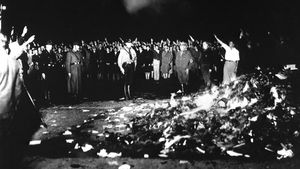Niche.
Half a decade ago, that was a word commonly used to describe Charli xcx and Troye Sivan. Their music was too odd, too queer, too niche to ever "go mainstream."
Personally, I didn't care. Like most of the world, I first heard xcx on the chorus of Iggy Azelea's "Fancy," then saw the success of "Boom Clap," so I kept an eye out for Selener. I remember when "Vroom Vroom" came out in 2016. I didn't get it on the first listen. It was so... loud, metallic, chaotic. So why couldn't I stop playing it on repeat?? And who the hell is Sophie???
And for many queer kids who came out in the 2010s, Sivan's Blue Neighborhood was the first album that grappled with the fear that engulfed so many of us in the closet while holding space for the hopefulness of the future, the desperation to be loved. If my Tumblr reblogs were any indication, I was certifiably obsessed.
I'd blast xcx's "I Got It" to the annoyance of my roommates and declare it as the song of the year on Stan Twitter. I crafted pregame playlists with "My My My" and "1 Night." I'd sit all my friends down for annual screenings of Sivan's Blue Neighborhood music video trilogy. I went to Sivan's SXSW showcase with two hundred people and xcx's LA warehouse parties and even their first joint show in 2019, where I used a hashtag and was randomly selected to meet Sivan backstage.
I'd ride for Charli and Troye.
When the pop music of the 2010s was big and bombastic with universal messaging everyone could relate to, these songs were for not just me, but for a community. Across international borders and races and ethnicities and religions and identities, this music attracted outsiders, overlooked and underloved, so we sought out each other. And we danced.
That hungry fanbase set the stage for both pop stars' meteoric rise today. xcx said it herself in a recent interview with i-D.
"I think it’s a really interesting time in pop music where [being] niche is being rewarded in a way that we haven’t seen for a while," she said. "It feels like there’s this new wave of artists with different ambitions and cultural touchpoints who are really thriving in mainstream culture. And I think that’s myself, that’s Troye [Sivan], that’s Chappell [Roan]. When I think about the three of us, that’s a lot of music that either is inherently a part of queer culture or is very much inspired by it and that’s super cool."
In 2024, pop stars are primed by the fandoms they've already built. Record labels would much rather put their money behind someone who already has an audience than take a chance on up-and-coming talent. Finally, musicians who have been building diehard fanbases have the foundation to elbow their way through to the public consciousness.
I attended the Sweat Tour in Los Angeles, but my seat in the back of the Kia Forum felt bittersweet. I was nostalgic for the warehouses. I love Sivan's sexy new era of bangers and BPM, but I longed for the drama of "Fools" and "The Good Side." I missed being surrounded by Angels who sought xcx's music out when she was discarded as a one-hit wonder, who never hesitated to throw their arms in the air and dance to the clanging and synths, who would lose their mind when xcx literally screeched through the opening bars of "Vroom Vroom."
The Sweat Tour is nostalgic for that era too. The stadium show is fashioned like a massive warehouse show, from the lights to the underground cage to the camera work. Sivan has evolved into the sexy pop star I couldn't have even dreamed of when I was younger, and I can't imagine how he would've impacted me through my formative years. But it was xcx's performance of "Sympathy is a knife" that a realization hit.
The sleek choreography, bubblegum hooks, and pop star polish from 2022's Crash tour were nixed in favor of placing xcx front and center in a tattered white outfit, screaming "Why I wanna buy a gun?/Why I wanna shoot myself?" at the top of her lungs while ripping off shreds of her top, flinging herself on the floor, and feigning stabbing herself while rolling around. It felt primal. Guttural. Raw.
She's no longer chasing the industry's idea of who she could be as a pop star. She's something new, a pop star unlike we've ever seen before.
And I'd never felt so alive.
The brat era is winding down, but it has cemented itself as one of the most iconic pop culture moments of the 21st century. And though their rises felt massive this last year, neither Charli nor Troye are overnight success stories.
This is a turning point, a reckoning for new kinds of pop stars that took over a decade to build, and a pat on the back for the fans who believed in them from day one. Now we have to share them with the rest of the world, which feels both exciting and a bit sad. But we'll always remember the rush of those smaller shows, we'll always scream the loudest in every crowd, and we'll always know who was here first when niche wasn't synonymous with cool.




















































































